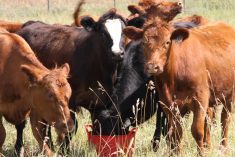WILLIAMS LAKE, B.C. – A winter of costly quarantines and testing for a suspected outbreak of anaplasmosis has prompted the British Columbia Cattlemen’s Association to push for changes in the disease’s status.The producers want anaplasmosis delisted as a federally reportable disease and declared an annually notifiable disease.The Canadian Food Inspection Agency takes control measures for such diseases when notified of their presence but no quarantines are imposed.Last winter, three suspected cases appeared in the Nicola Valley following a routine blood test at slaughter of a cull cow.Subsequent tests in June 2009 at nine other ranches in the region turned up 18 positive animals.The ranches were quarantined until this spring and 14,000 head were tested for the disease.CFIA said the disease was likely ehrlichia, a similar tick borne infection. About 30 wild deer were also tested.“The results in the deer showed three positives in the first test, with results similar to what was seen in the cattle,” said Judy Guichon, newly elected president of BCCA.“We are not sure what we are dealing with,” she said at the association’s annual meeting in Williams Lake, B.C., May 28-29.The association wants the province to study whether anaplasmosis exists in local wildlife.Anaplasmosis is a blood disease caused by a parasite and affects cattle, sheep, goats and deer.Positive cases of the disease have been found in Manitoba.When positive animals are destroyed there, the owners are compensated so producers would not likely support delisting it, said Ryder Lee of the Canadian Cattlemen’s Association.“Their feeling is very strong that this should stay reportable and then compensation is still intact,” said Lee.However Mike Rose of Quilchena Ranch said compensation was not the issue. He had hundreds of animals tested under quarantine.“The biggest problem was the logistics involved in testing thousands of animals,” he said.“The idiocy of this whole damned thing isn’t having the value of compensation for those one or two cows you are going to have to shoot. The idiocy is we in Canada are still holding ourselves up and saying we support this listing and restrict our markets for no reason,” said Rose.“Let’s just end this and see if we can get it delisted because it is a non-problem,” he said.Bill Freding of Oliver, B.C., said compensation does not begin to cover costs.
Read Also

The Western Producer Livestock Report – November 6, 2025
Western Producer Livestock Report for November 6, 2025. See U.S. & Canadian hog prices, Canadian bison & lamb market data and sales insights.















